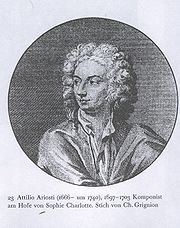
Attilio Ariosti
Encyclopedia

Italy
Italy , officially the Italian Republic languages]] under the European Charter for Regional or Minority Languages. In each of these, Italy's official name is as follows:;;;;;;;;), is a unitary parliamentary republic in South-Central Europe. To the north it borders France, Switzerland, Austria and...
composer
Composer
A composer is a person who creates music, either by musical notation or oral tradition, for interpretation and performance, or through direct manipulation of sonic material through electronic media...
in the Baroque
Baroque music
Baroque music describes a style of Western Classical music approximately extending from 1600 to 1760. This era follows the Renaissance and was followed in turn by the Classical era...
style, born in Bologna
Bologna
Bologna is the capital city of Emilia-Romagna, in the Po Valley of Northern Italy. The city lies between the Po River and the Apennine Mountains, more specifically, between the Reno River and the Savena River. Bologna is a lively and cosmopolitan Italian college city, with spectacular history,...
. He produced more than 30 opera
Opera
Opera is an art form in which singers and musicians perform a dramatic work combining text and musical score, usually in a theatrical setting. Opera incorporates many of the elements of spoken theatre, such as acting, scenery, and costumes and sometimes includes dance...
s and oratorio
Oratorio
An oratorio is a large musical composition including an orchestra, a choir, and soloists. Like an opera, an oratorio includes the use of a choir, soloists, an ensemble, various distinguishable characters, and arias...
s, numerous cantatas and instrumental works.
Life
He was born into the middle class. He became a monk in 1688 at age 22, but he soon obtained permission to leave the order and become a composer in the court of the Duke of Mantua and Monferrato. He became a deaconDeacon
Deacon is a ministry in the Christian Church that is generally associated with service of some kind, but which varies among theological and denominational traditions...
in 1692, the same year he achieved the post of organist at S. Maria dei Servi in Bologna.
In 1697, he went to Berlin at the request of Sophia Charlotte of Hanover
Sophia Charlotte of Hanover
Sophia Charlotte of Hanover was the Queen consort of Prussia as wife of Frederick I of Prussia. She was the daughter of Ernst August, Elector of Hanover, and Sophia of the Palatinate...
, Queen of Prussia
Prussia
Prussia was a German kingdom and historic state originating out of the Duchy of Prussia and the Margraviate of Brandenburg. For centuries, the House of Hohenzollern ruled Prussia, successfully expanding its size by way of an unusually well-organized and effective army. Prussia shaped the history...
, a great-granddaughter of James I of England
James I of England
James VI and I was King of Scots as James VI from 24 July 1567 and King of England and Ireland as James I from the union of the English and Scottish crowns on 24 March 1603...
and daughter of the Electress Sophia of Hanover
Sophia of Hanover
Sophia of the Palatinate was an heiress to the crowns of England and Ireland and later the crown of Great Britain. She was declared heiress presumptive by the Act of Settlement 1701...
, an enlightened patroness of the arts with a keen interest in music. After enjoying the favor of the Queen, Ariosti wrote and collaborated in the writing of a number of stage works performed for the court in Berlin. He resided in Berlin
Berlin
Berlin is the capital city of Germany and is one of the 16 states of Germany. With a population of 3.45 million people, Berlin is Germany's largest city. It is the second most populous city proper and the seventh most populous urban area in the European Union...
as the court composer until 1703.
His first opera was performed in Venice
Venice
Venice is a city in northern Italy which is renowned for the beauty of its setting, its architecture and its artworks. It is the capital of the Veneto region...
in 1697. From 1703 to 1709 he was the General Austrian Agent for Italy, under the reign of Joseph I
Joseph I, Holy Roman Emperor
Joseph I , Holy Roman Emperor, King of Bohemia, King of Hungary, King of the Romans was the elder son of Emperor Leopold I and his third wife, Eleonor Magdalene of Neuburg....
. After 1716 he achieved enormous success in Paris and London. In London, he shared with Georg Friedrich Händel and Giovanni Bononcini the directorship of the Royal Academy of Music
Royal Academy of Music
The Royal Academy of Music in London, England, is a conservatoire, Britain's oldest degree-granting music school and a constituent college of the University of London since 1999. The Academy was founded by Lord Burghersh in 1822 with the help and ideas of the French harpist and composer Nicolas...
, and he played the viola d’amore in an entr’acte in Händel’s Amadigi. In 1724 he published a Collection of Cantatas, and Lessons for the Viola d'Amour, which he sold by subscription. This publication may have been the most successful sale of music by subscription in the 18th century.
Although he could sing, write drama, play the violoncello and harpsichord, his favorite instrument was the viola d'amore
Viola d'amore
The viola d'amore is a 7- or 6-stringed musical instrument with sympathetic strings used chiefly in the baroque period. It is played under the chin in the same manner as the violin.- Structure and sound :...
, for which he wrote 21 solo sonatas. These are usually called the Stockholm Sonatas, as the sole surviving source for most of them is in the Statens Musikbibliotek in Stockholm, Sweden. The Stockholm Sonatas display Ariosti's liking for surprising harmonies, his inventive use of silence, and his wit.

